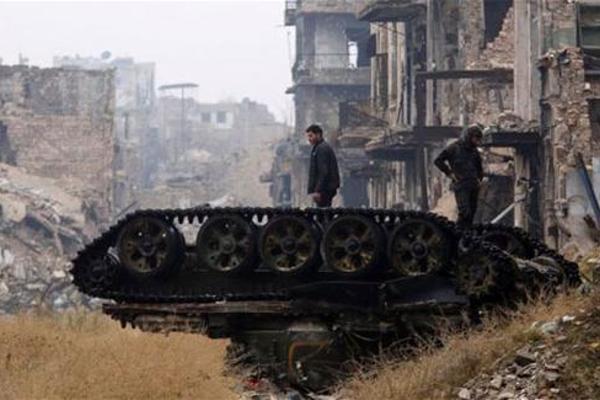Truce declared in Syria on Turkish-Russian plan
ANKARA


REUTERS Photo
Turkey and Russia have brokered a nationwide cease-fire between the regime and opposition forces in Syria with hopes that it will be followed by talks for a negotiated political solution in the war-torn country.The cease-fire will begin on Dec. 30 and will exclude groups designated as terrorists by the United Nations, meaning the Islamic State of Iraq and the Levant (ISIL) and al-Nusra.
“As is known, we have long been working hard to launch negotiations between the regime and the opposition for a comprehensive political resolution of the conflict, to cease violence and to provide humanitarian aid. As a result of our efforts, an agreement between fighting parties in Syria to begin a cease-fire as of 00.00 on Dec. 30, 2016, has been reached. We welcome this development,” Turkey’s Foreign Ministry said in a written statement that was released on Dec. 29.
The agreement stipulates the cessation of all armed attacks, including aerial campaigns, and stopping efforts to expand territory under one’s control.
“Groups deemed terror organizations by the U.N. Security Council are excluded from this agreement,” it said, adding that Turkey and Russia supported this deal as two guarantor countries.
Turkey, Russia and Iran signed a declaration on Dec. 20 in Moscow to outline their joint position on Syria with a commitment to launch fresh political talks between the regime and opposition groups. The declaration named the three countries as guarantors of the process.
“It’s very important that all parties conform to this agreement. Turkey and Russia will jointly follow the cessation of hostilities as they have given strong support to it,” the statement read. It also called on Iran in an indirect way to provide necessary support to the agreement by using its influence on fighting groups. Earlier in the day, Foreign Minister Mevlüt Çavuşoğlu called for the Hezbollah to be withdrawn from Syria.
Astana talks next target
The ministry recalled that Turkey played a decisive role in the evacuation of Aleppo and the provision of a nationwide cease-fire in Syria. It also added it would continue its efforts to revive talks on a political transition process in Syria under U.N. auspices and in line with U.N. Security Council Resolution 2254.
Turkey also underlined its support for possible political negotiations between the regime and opposition groups in Astana in mid-January. Along with two negotiating parties, Turkey, Russia and Iran will also be in Astana.
“The talks in Astana will be under our auspices. But we won’t share the table and negotiate with [the regime],” Çavuşoğlu said in an interview with A Haber on Dec. 29, stressing that Ankara believes President Bashar al-Assad cannot realize any political transition in Syria.
The minister also rejected a Reuters report which suggested that a deal between Russia and Turkey would allow al-Assad to stay until the next presidential election when he would quit in favor of a less polarizing Alawite candidate.
‘We have not negotiated the future of al-Assad’
“We have not negotiated the al-Assad issue,” Çavuşoğlu said, adding that the parties to the deal were certain on al-Assad. “We said, ‘let’s leave it aside for now and let the Syrian opposition present their visions,’” Çavuşoğlu said, referring to the discussions with Russia and Iran.
He stressed that they should reach a cease-fire before meeting for negotiations in Astana, since it was not realistic for opposition groups to attend peace discussions before a truce. Ankara stipulated that the People’s Protection Units (YPG) not be at the peace negotiations in Astana, the minister noted.
The YPG could only be part of the talks for a resolution in Syria if they “leave behind terrorist activities and ambitions for cantons,” the minister said, underlining that the group should respect the territorial integrity of Syria.
The YPG and its political wing, the Democratic Union Party (PYD), have said they do not desire independence but wish to see a democratic and federal Syria.
Turkey suspended air strikes in al-Bab ‘at Russia’s request’
Russia also asked the Turkish Army to suspend flights over al-Bab region to avoid creating any problems for Russia in its staging of air strikes against ISIL in Palmyra, according to the foreign minister.
However, Çavuşoğlu asked for permission to resume flights by Turkish warplanes over al-Bab during a recent phone conversation with Russian Foreign Minister Sergei Lavrov. “I think this problem will be eliminated,” he said.
Bad weather conditions also played a role in the suspension of Turkish air strikes in the region, he noted.
Asked if Russia and Turkey could cooperate in the latter’s military operation in al-Bab, he said, “We can cooperate with anyone regarding struggle against [ISIL], but there is no such cooperation with Russia at the moment, he noted.
